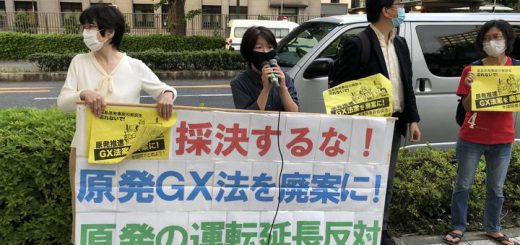An Open Discussion about Reprocessing Policy was held Nuke Info Tokyo No. 96
On July 12th a workshop entitled “An Open Discussion about Nuclear Energy Policy Part 1 — what to do with reprocessing spent nuclear fuels” was held by the Research Group for Geological Disposal Problems, which was formed as a joint-study group of Takagi School and CNIC for critically reviewing the proposed nuclear disposal plan. The plan for Japanese geological disposal is promoted on the condition that spent fuels are vitrified. That is, all the spent fuels are planned to be reprocessed. However, before the TEPCO’s cover up scandal in August 2002, pluthermal plan has been brought to a standstill and Rokkasho Village in Aomori Prefecture, where a reprocessing plant is currently under construction, has become the focus of attention. Against this background, therefore, this workshop on nuclear reprocessing was organized which would invite a discussion of the geological disposal of nuclear wastes. The symposium was led by Shohei Yonemoto (Center of Life Science and Society) with following panelists: Kawada Tomio (Japan Nuclear Cycle Development Institute, JNC), Nagano Hiroshi (Young Nuclear Scientists Study Group), Tetsunari Iida (Institute for Sustainable Energy Policies), and Yo Fujimura (Kyoto University/Geological Disposal Research Group).
Regarding Japan’s energy policy, Mr. Fujimura stated his stance against the use of nuclear energy, then he argued that time had come to review nuclear power. He postulated that at least the construction of new nuclear power plant should be stopped and that a discussion including the option for the abolishment of nuclear power should be needed. Mr. Kawada said that nuclear power was still indispensable since the substitution with renewable energies was not realistic and it is obvious that fossil fuels would be exhausted in the future. Mr. Nagano pointed out that because of the difficulty in constructing new power plants and increasing number of power plants was to be decommissioned, the contribution from nuclear energy will decline in reality. He raised the question how the existing gap would be covered, even if it were possible to raise the output again. He suggested that the promoters of nuclear energy should make a long-term vision. On the other hand, Mr. Iida pleaded for a shift to renewable energies and an efficient use of energy. He made the concrete proposal that nuclear energy should be phased out while agreed on a total power generation from nuclear power.
In regards to the nuclear fuel reprocessing, Mr. Kawada stated that as long as Japan was pursuing nuclear power, reprocessing policy was necessary. However, he explained further that since a realistic utilization of plutonium was not in sight, there was no hurry in the operation of Rokkasho reprocessing plant. Mr. Nagano said that the decision on the reprocessing plant should not be made as such that it could not be backtracked later. He proposed that the spent fuels should be stored in an interim storage site and that the construction of Rokkasho plant should be halted. He also said that it was time to stop and think about the whole issue again. Mr. Fujimura pointed out that the reprocessing policy would be deadlocked and technical problems would also persist with the handling of nuclear wastes if the Rokkasho reprocessing plant started its operation, MOX fuel fabrication plant would be necessary as plutonium would become in surplus. Mr. Iida pointed out to drew the audience’ attention to the economical inefficiency of the Rokkasho reprocessing plant in particular and he called for a shut down of the plant.
An important result of the symposium is the fact that all panelists in spite of the difference in opinion regarding the reprocessing policy agreed that a speedy start up of the Rokkasho reprocessing plant was not necessary.
(Hideyuki Ban, CNIC Co-director)

